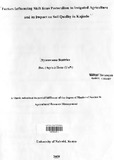| dc.description.abstract | Crop cultivation in the arid and semiarid ecosystems is mainly constrained by inadequate and
unreliable rainfall. Smallholder irrigation in such areas is therefore necessary to supplement
l rainfall to meet crop water requirements. As cultivated agriculture encroaches into marginal
ecosystems that are fragile and delicate, there is need to understand the drivers of the transition
from pastoral to irrigated agriculture and the effects of irrigation on soil quality for better
management of the smallholder irrigation systems towards increased and sustainable crop
production. A study was therefore carried out to investigate the factors influencing the transition
to irrigation farming and the effects of the transition on soil quality and subsequently the soil
conservation management practices adopted under the new farming regime. The study
objectives were to: (1) Investigate the social-economic factors that influence transition from
pastoral grazing to irrigated smallholder crop production. (2) Assess existing soil management
practices and the socioeconomic factors that influence the farmers' decision on whether to or not
to conserve soil. (3) Assess the quality of irrigation water at different times/seasons in the year.
(4) Asses the effect of smallholder irrigated crop production on sele cted soil ph ysical and
chemical properties along the Olkeriae River basin. Primary data on socioeconomics was
collected through personal interviews using a semi-structured questionnaire. Pro bit regression
was used to analyse the factors driving the transition to irrigated-crop farming and factors
determining soil management practices. Water samples were collected from the shallow wells
used for irrigation and analysed. To examine the effect of change in land use on the soil quality,
surface soil (0-10cm) was sampled from randomly selected fields under irrigation and under
natural vegetation along the river. Both chemical and physical properties of the soils were
analysed. The socio-economic factors th~t influenced the shift to irrigation included education
and age of the household head, household size, distance to the agricultural agent, access to
information, distance to market and access to hired labour. The factors that influenced the use of
soil management practices included age and education of household head, household size, access
to information, access to hired labour, irrigation experience and involvement of the farmer in
promotion of soil conservation activities. Irrigation water had medium salinity with a mean
electrical conductivity of 0.94 dSm-1 during the dry season and 0.85 dSm-1 during wet season.
The sodium level was high and ranged between 4.50 me/l to 2.48 me/I for dry and wet season,
respectively. The water was found to be of marginal quality for irrigation and therefore there is a
likelihood of the soils becoming saline over time. Bulk density, available water capacity and
saturated hydraulic conductivity were higher in the grazed sites compared to the cultivated sites,
while total porosity was lower. Soil texture was silty clay loam for all sites. The soils were nonsaline
and non-sodic with very low organic matter in the cultivated areas and high electrical
conductivity in the grazing sites. There is therefore need for adoption of appropriate soil
management practices such as application of organic fertilizers, adequate water application and
deep tillage to prevent build-up of salts in the cultivated areas. | en |

